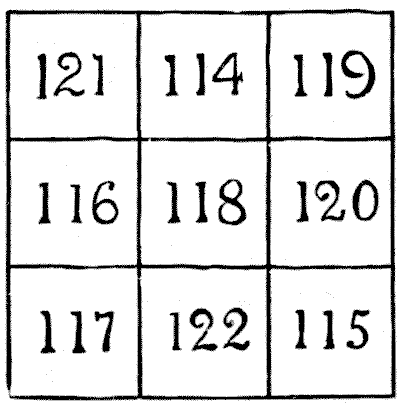(related to Problem: A Magic Square Of Composites)
The problem really amounts to finding the smallest prime such that the next higher prime shall exceed it by $10$ at least. If we write out a little list of primes, we shall not need to exceed $150$ to discover what we require, for after $113$ the next prime is $127.$ We can then form the square in the diagram, where every number is composite. This is the solution in the smallest numbers. We thus see that the answer is arrived at quite easily, in a square of the third order, by trial. But I propose to show how we may get an answer (not, it is true, the one in smallest numbers) without any tables or trials, but in a very direct and rapid manner.

First write down any consecutive numbers, the smallest being greater than $1$ — say, $2,$ $3,$ $4,$ $5,$ $6,$ $7,$ $8,$ $9, 10.$ The only factors in these numbers are $2,$ 3, $5,$ and $7.$ We, therefore, multiply these four numbers together and add the product, $210,$ to each of the nine numbers. The result is the nine consecutive composite numbers, $212$ to $220$ inclusive, with which we can form the required square. Every number will necessarily be divisible by its difference from $210.$ It will be very obvious that by this method we may find as many consecutive composites as ever we please. Suppose, for example, we wish to form a magic square of sixteen such numbers; then the numbers $2$ to $17$ contain the factors $2,$ $3,$ $5,$ $7,$ $11,$ $13,$ and $17,$ which, multiplied together, make $510510$ to be added to produce the sixteen numbers $510512$ to $510527$ inclusive, all of which are composite as before.
But, as I have said, these are not the answers in the smallest numbers: for if we add $523$ to the numbers $1$ to $16,$ we get sixteen consecutive composites; and if we add $1,327$ to the numbers $1$ to $25,$ we get twenty-five consecutive composites, in each case the smallest numbers possible. Yet if we required forming a magic square of a hundred such numbers, we should find it a big task by means of tables, though by the process I have shown it is quite a simple matter. Even to find thirty-six such numbers you will search the tables up to $10,000$ without success, and the difficulty increases in an accelerating ratio with each square of a larger order.
This eBook is for the use of anyone anywhere in the United States and most other parts of the world at no cost and with almost no restrictions whatsoever. You may copy it, give it away or re-use it under the terms of the Project Gutenberg License included with this edition or online at http://www.gutenberg.org. If you are not located in the United States, you'll have to check the laws of the country where you are located before using this ebook.